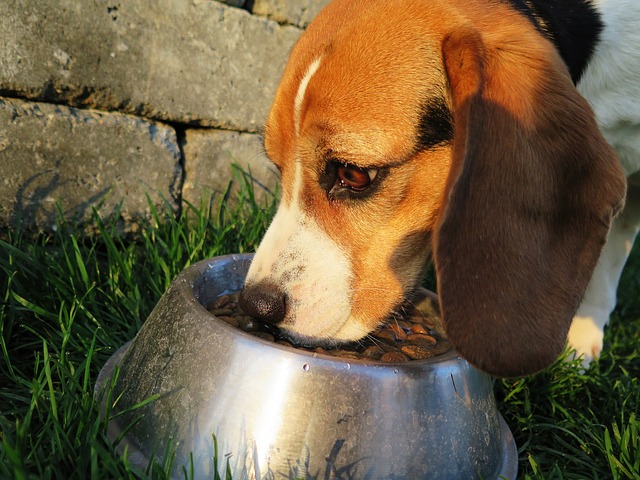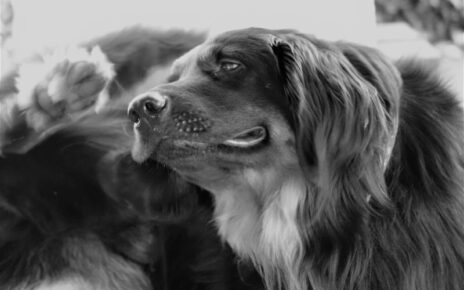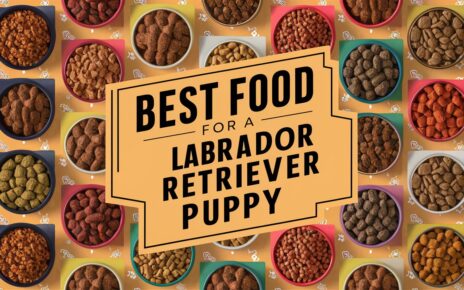When selecting the right food for your dog, you have to be sure you are making the right decision for your pets health and happiness. In recent years grain free dog foods have become a major focal point in dog health and wellness. And while most advocates of grain free dog foods extol their benefits, as a informed dog owner you should always look at both sides of the story. As with anything you give to your dog, you have to weigh the pros and cons of grain free dog food before you make a final decision.
What is Grain Free
Before diving into the individual pros and cons of a grain free diet, it will be good to understand what grain free dog food means in the first place. The real meaning of grain free is that no seeds from grass plants (what we call grains) are added to a dog food.
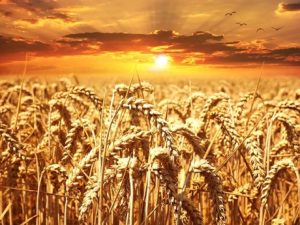
The thinking behind not feeding dogs grass seeds like corn, wheat, barley or rye is that dogs and wolves wouldn’t eat them in their natural environment. And if grains aren’t part of a dogs natural diet, why are they added to dog food in the first place.

One myth that does need to be dispelled is that dogs can’t digest grains, this is not true. Even though grains can be harder to digest, a dog can digest them. The ability to digest starches is actually an evolutionary trait, that they acquired while living with humans for so long. We know this because wolves unlike dogs, are almost completely unable to digest grains and starches.
This trait most likely cropped up thanks to how much people care for dogs. Since we were feeding wild dogs all of our scraps for so long, they eventually adapted to the foods in their new diet. Even if dogs can digest grains that doesn’t mean a diet high in grains is healthy for a dog, or even humans for that matter.
There are other medical and health reasons for not feeding a dog grains, and they will be explored more in the pros and cons below. But suffice it to say grain free dog food is a pretty simple concept, it is dog food with no added grains.
Does this mean it is completely natural and unprocessed? No, it just means it lacks any grains, if you are worried about other fillers, or you want to feed your dog the diet of their ancestors the wolf, a grain free diet might not be enough for you.
Pros and Cons of Grain Free Dog Food
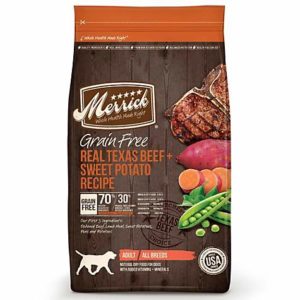
Pros
While there is a long list of benefits associated with grain free dog food. The following cover the main positive points of feeding a grain free diet to a dog.
Easier to Digest
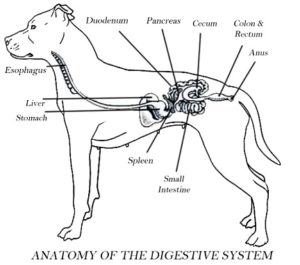
Even though dogs have the enzymes to digest starches grains can still be hard for them to digest. A dogs digestive system is still made for a meat based diet, and breaking down grains can still tax a dogs system. One major problem with feeding a dog grains is excessive gas. When a dog is fed more grains than they can handle, bacteria and fungi in their intestines will consume the excess carbohydrates and produce gas.
Another major concern when feeding a dog grains are the anti-nutrients they contain. These anti-nutrients include Phytic Acid, Gluten, Lectins and Trypsin Inhibitors. All of these anti-nutrients can cause intestinal problems for a dog. Their effects range from intestinal discomfort, to malabsorption of vital nutrients. Due to these substances eating grains can lead to vitamin and mineral deficiencies, which can lead to other potential diseases over time.
Skin and Hair Health

Feeding a dog a grain free diet is often associated with improvement in skin and hair health. Eating grains can cause some dogs to have dry and flaky skin. Another common problem with grain fed dogs is a dull coat. Both the skin and hair problems are related to grains poor nutritional profile.
The main reason why grains might lead to dry skin and hair, is that they lack the proper balance of Omega 3 & 6 fatty acids. Grains tend to be very high in Omega 6 but low in Omega 3, for healthy skin and hair a dog needs more Omega 3’s in their diet.
Once a dog is moved to a healthier grain free dog food, that replaces some of the empty carbohydrates with foods with a better balance of essential fatty acids. You should start to see some improvements in their skin and hair.
Better Breath and Oral Hygiene

One thing we all would like to keep under control is our dogs breath. Not only is bad breath offensive, it is a strong indicator of much bigger oral health problems. One way to help combat bad breath is to feed a dog a grain free diet. Grains and excessive carbohydrates can lead to bad breath and other dental diseases.
When a dog is fed a diet high in grains the carbohydrate residues can stick to their teeth, and promote the growth of bad bacteria. And since a dog won’t usually have their teeth brushed every day, the bacteria can turn in to tartar and plaque. This tartar and plaque can lead to gum disease like gingivitis and possibly even heart problems later on for the dog.
By switching a dog to a grain free diet, you can greatly reduce their risk of a range of dental diseases. And you will get the added benefit of having a dog with half decent breath.
Helps with Food Allergies
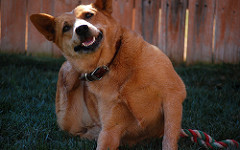
Dogs that have food allergies or intolerance’s can benefit from being put on a grain free diet. Signs of a food allergy can range from excessive itching, hair loss, and even hives and other skin eruptions. While grains are not the only foods that can cause food allergies, they are one factor to isolate when trying to find the cause.
The main culprit in most food allergies is an abnormal reaction to a protein in a certain food. The grains that tend to cause the most allergies in dogs are wheat and corn. And it just so happens these are the grains found in most dog foods.
If you think your dog may be allergic to their food try switching them to a grain free dog food, and see if their symptoms improve. Even if grains are not the culprit, removing them can still be a benefit by completely ruling them out.
Helps Diabetic Dogs

Diabetic dogs need to be kept on a low carbohydrate diet in order to keep their blood sugar levels in check. By putting a diabetic dog on a grain free diet, you may be able to help control their blood sugar swings. While a grain free dog food is not devoid of carbohydrates, it does have healthier foods like sweet potatoes as their primary carbohydrate source. These healthier carbohydrate sources tend to have a lower glycemic index, which can help limit blood sugar spikes.
While a grain free dog food might not be the solution for all diabetic dogs, it can help. As always with any serious health condition consult with your veterinarian before making any changes to their diet. If on the other hand you want to limit the possibility of your dog developing diabetes, a grain free diet would reduce the risk of your dog becoming insulin resistant.
Cons
Expensive

One of the most noticeable downsides of grain free dog foods is their price. If you ever shopped for grain free dog food, you may have noticed they can be almost double the price of regular grain based dog food. Due to their high price they can cost more than some peoples budgets allow.
Some of the reasons for the high price are that grains are a very cheap commodity, and the foods they are replace with are not. Another factor in the high price could be like any new diet the manufactures know they can get away with charging more.
Dogs Preference
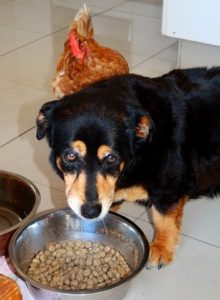
One thing that could happen when you try to feed a new food to a dog, is they just don’t like it. This might be due to the food being grain free, but it can be hard to tell. If a dog will accept other grain based foods, but will not eat a grain free food they might just prefer a grain based diet. This can be more of a problem with picky eaters or old dogs who are set in their ways.
A dog turning down food on the first try is not a deal breaker. You can still keep introducing the grain free food multiple times and see if they eventually eat it. But if they keep avoiding the grain free food, it’s best to just give them what they want and move on from the grain free experiment.
Availability

While grain free dog food is becoming more popular, it may not always be available at all local pet stores and supermarkets. And even if grain free dog food is available, the amount of product they have in stock can be much lower than regular dog food. This could lead to times where you have to walk out of the store empty handed, because they don’t have the food you are looking for.
While this problem is getting much better as grain free diets start to catch on. It can still be a hindrance when making a complete switch to a grain free diet for your dog.
Not Really Needed

While we all want to provide the best food for our dogs, sometimes our wishes can override our better judgment. If your dog is already doing fine on their current diet, a grain free dog food vs regular one isn’t going to work miracles. A grain free diet might sound nice, but it will require a little extra effort to find and it will cost more money.
Some dogs will even do better on a grain based diet. This is especially true for elderly dogs that are already adapted to grain, and might experience discomfort when switching off. And even though grain free food can help some dogs with allergies, that doesn’t mean they can’t cause some of their own.
High in Carbohydrates
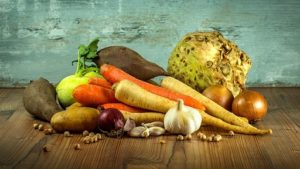
Even though grain free dog foods have healthier carbohydrate sources, they can still be relatively high in carbohydrates. If you have a dog that needs to be on a very low carbohydrate or no carbohydrate diet, a grain free dog food might not be the best choice. While grain free diets can help with a dog who needs to eat a slow carbohydrate diet, they are by no means a low carbohydrate dog food at all.
Where this can be a problem is if you have a dog that is Type I Diabetic and needs to be on a very strict diet. Or a dog who just can’t eat any carbohydrates at all due to intestinal problems. Overweight dogs will also have a better chance of losing weight if they are put on a very low carbohydrate diet. For these reasons a grain free dog food might not be the best diet, especially for dogs who truly need a low carbohydrate food.

